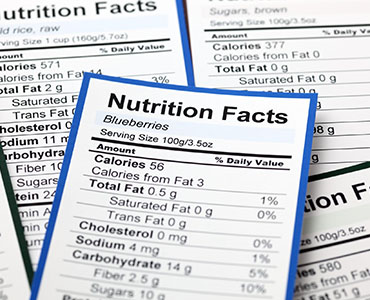- 11
- Nov

Health Ministry prioritises food labelling in battle against NCDs
With prevailing concerns over obesity as a modifiable risk factor for non-communicable diseases (NCDs), such as diabetes, the Ministry of Health & Wellness is prioritising progress on food labelling in the work of its National Food Industry Task Force.
Minister of Health and Wellness, Dr. the Hon. Christopher Tufton made the revelation in a virtual meeting convened with the Task Force yesterday (Tuesday, November 10).
Specific goals include making progress on the front-of-package labelling using the ‘HIGH IN’ format, which graphically indicates if a product contains high levels of nutrients such as sugar, sodium (salt) and/or fats.
This comes as Ministries of Health and National Bureaus of Standard within the Caribbean Community do consultations to gather feedback from stakeholders for the revision of the 2010 CARICOM Regional Standard for Specification for labelling of pre-packaged foods (CRS 5:2010) and a separate standard for nutritional labeling.
Data gathered on ‘HIGH IN’ labelling has shown that this labelling method is not only easily identifiable, but also readily understood by consumers and instructive for their decision-making about what products are least harmful to their health.
The Task Force, set up by Minister Tufton in 2016, is, in addition to food labelling, mandated to address product reformulation, food marketing as well as advocacy and communication. Included in the items being addressed under those areas are:
- Reduction of children’s exposure to unhealthy food advertising;
- Reduction in portion sizes of energy dense foods and products;
- Improvement in the quality of foods sold by food outlets and vendors;
- The dangers of unhealthy eating;
- The incentives and disincentives of fiscal policy initiatives; and
- Support for food manufacturers and vendors in using healthier ingredients.
Achievements to date include the development of the Interim Guidelines for Beverages in Schools, which were approved by Cabinet in 2018 against the background of the evidence which shows, among other things, a consistent and compelling link between the consumption of sugar-sweetened beverages (SSBs) and childhood obesity.
Also included in the achievements is the upgrade of laboratories of the Bureau of Standards and the Scientific Research Council, giving Jamaica the capacity to test for sugars, salt, total fat, saturated fat and trans-fat.
Jamaica is currently the only country with that testing capacity in the Caribbean.
Meanwhile, Minister Tufton said the value of the work of the National Food Industry Task Force has never been more important, given the prevailing NCDs challenge facing the country.
One in three Jamaicans 15 years and older have hypertension, according to the Jamaica Health and Lifestyle Survey (JHLS), 2016-2017. Also according to the JHLS, one in eight Jamaicans has diabetes. Four of every 10 Jamaicans with either diabetes or hypertension are unaware of their status.
Further, one in two Jamaicans, including children and teens, is overweight or obese – fueled not only by the increased consumption of sweetened beverages, but also limited fruit and water intake and low levels of physical activity
“The 2017 School Health Survey tells us, for example, that some 24% of students were overweight and 9% were obese, with 20% spending more than eight hours per day sitting, 68% drinking carbonated drinks one or more time per day while more than half ate fast food on one or more days per week,” said Minister Tufton.
“This is not data to which we can turn a blind eye. It is data on which we must act and the National Food Industry task Force is doing just that,” he added.

